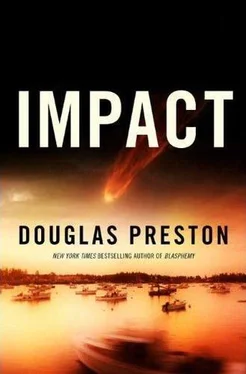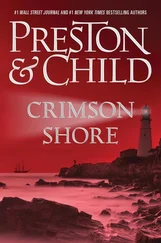"Glad to be of service," said Ford, with a touch of irony. Then he added, casually, "One thing I almost forgot."
"Yes?"
"You mentioned that the asteroid broke in two and that the two pieces struck the Earth."
"Correct."
"That's wrong. There was only one object involved."
"Impossible," said Mickelson. "Our scientists are certain there were two strikes, one in the Atlantic, one in Cambodia."
"No. The mine in Cambodia wasn't an impact crater."
"What was it then?"
"An exit hole."
Lockwood stared, while Mickelson rose from his chair. "Are you suggesting--?"
"That's right. The meteorite that struck in Maine passed through the Earth and exited in Cambodia. The data on that flash drive should confirm it."
"How can you tell the difference between an entrance and exit hole?"
"It's not unlike entrance and exit wounds caused by a bullet: the former is neat and symmetrical, the latter a God-awful mess. You'll see what I mean."
"What on God's name could go through the Earth?" Mickelson said.
"That," said Ford, picking up his check, "is a damn good question."
38
Abbey had prepared cheeseburgers for dinner but they were overcooked and dry, the cheese had burned in the pan, and the buns were soggy. Her father sat across the table, chewing silently, eyes downcast, his jaw muscles working slowly. He had been ominously silent all evening.
He laid the half-eaten burger down on his plate, gave the plate a token push, and finally looked at Abbey. His eyes were bloodshot. She thought for a moment he might have started drinking again, which he'd done pretty hard after her mother's death. But, no, that wasn't it. He didn't smell of beer.
"Abbey?" His voice was hoarse.
"Yes, Dad?"
"I heard from the insurance company."
She felt the lump of burger in her mouth sort of stick. She made an effort to swallow it down.
"They're not covering the loss."
A long silence.
"Why not?"
"It was a commercial policy. You weren't lobstering. What you were doing they consider recreation."
"But . . . you could always say I was lobstering."
"There's a Coast Guard report, police reports, newspaper articles. You weren't fishing. End of story."
Abbey's mouth had gone dry. She tried to think of something to say and couldn't.
"I still owe on the boat, and until it's paid off there's no way I can get a loan for another. I'm paying on a mortgage that's worth more than the house. What little savings I had went to your year-and-a-half messing around in college."
Abbey swallowed again, staring at the plate. Her mouth was dry as ashes. "I'll give you my waitressing money. And I'll sell the telescope."
"Thank you. I'll accept the help. Jim Clayton's offered me a position as stern man this season. With what you make and I make, if it's a good season, we might just keep the house."
Abbey felt a giant tear creep out of her eye and roll down the side of her nose, hang there, and fall on the plate. Then came another, and another. "I'm really sorry, Dad."
She felt his rough hand seek hers, close around it. "I know."
She hung her head, the tears dropping on her burger bun, making it soggy. After a moment her father released her hand and rose from his place. He went over to his old Black Watch tartan chair by the woodstove, settled into it, and picked up The Lincoln County News .
Abbey cleared the plates, scraped the uneaten burgers into the bin for the chickens, and washed the dishes in the sink, stacking them on the side. Her father had talked about getting a dishwasher someday, but that day was never going to come.
Well, Abbey thought, with a curious sense of numb detachment, she had pretty much ruined her father's life.
39
"You have arrived at your destination," said the smooth female voice from the GPS. Wyman Ford parked the car in the apron of dirt in front of the country store and got out, looking around. The field opposite the store was swaying with lupines ready to burst into flower. At the top of the hill behind him were two churches flanking the street, one a brown Congregationalist church and the other a white Methodist "house of worship." A dozen clapboard houses lined the road and a small grocery occupied a listing, shingled building.
That was the extent of the town.
Ford consulted his notebook. The towns of New Harbor, Pemaquid, Chamberlain, and Muscongus had been crossed out, leaving one left.
Round Pond.
The road ran past the store and dead-ended at the harbor. He could just see, beyond a cluster of pine trees, a harbor full of fishing boats and a small sliver of ocean beyond.
He went into the country store and found it noisy with kids buying penny candy. He walked around, looking at the items for sale: the candy, postcards, knives, boat models, toys, puppets, kites, CDs of local musical groups, calendars, jams and jellies, and a stack of newspapers. It was like walking back in time to his own childhood.
He picked up the newspaper, called The Lincoln County News , and got in line with the kids. A few minutes later they had banged out the door with their brown paper bags of candy. A high school girl was manning the counter. He laid down the paper on the counter and smiled. "I think I'd like some candy."
She nodded.
"I'll take a . . . let's see . . . a fireball--haven't had one of those in years--some malted milk balls, a rope of licorice, and a peppermint stick."
She collected the candy in a bag, laid it on the paper. "Two dollars ten cents."
He fished in his pocket, took out his wallet. "I heard a meteor came over here a few months back."
"That's right," the girl said.
He thumbed through the bills in the wallet. "You see it?"
"I saw the light out the window. Everybody did. And then there was a sound like thunder. When we went outside there was a glowing trail in the sky."
"Did anyone find the meteorite?"
"Oh no, it hit out to sea."
"How do they know?"
"That's what all the papers said."
Ford nodded, finally getting the money out.
"Is the harbor down there?"
She nodded. "Take the right past the store--dead-ends at the wharves."
"Any place to buy live lobster?"
"The co-op."
He took the bag of candy and the paper and went back to his car. Popping the fireball in his mouth, he looked at the front page of The Lincoln County News . Plastered at the top was a headline:
Body, Gun Recovered from Sunken Boat
There was a blurry photograph of a Coast Guard vessel at sea hauling a body on board with grappling hooks. Ford read the article, his interest piqued. Turning to the inside, he saw a picture of the two girls who'd been attacked, a high school yearbook picture of the dead attacker, and several photographs of the ruined boat hauled into dry dock. This was big news in Round Pond--a high-seas robbery attempt, complete with a boarding, attempted murder, and a sunken boat. Something to do with a legendary treasure. It aroused his investigative instincts: the story had gaps, inconsistencies, which cried out for explanation.
He turned the page, read about the bean supper at the Seaside Grange, complaints about a new traffic light, an article about a soldier returning from the Middle East. He scanned the police notes, read a scolding editorial about a poorly attended school board meeting, looked through the real estate and employment ads, read the letters to the editor.
Finally he folded up the paper, charmed by the picture he had acquired of the town. A quiet little New England fishing village, impossibly picturesque, economically stagnant. Someday the real estate developers would get their hooks in a town like this and it would be all over. He hoped that someday never arrived.
Читать дальше












